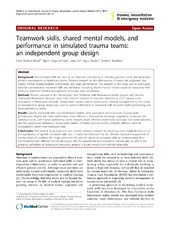| dc.contributor.author | Westli, Heidi Kristina | |
| dc.contributor.author | Johnsen, Bjørn Helge | |
| dc.contributor.author | Eid, Jarle | |
| dc.contributor.author | Rasten, Ingvil | |
| dc.contributor.author | Brattebø, Guttorm | |
| dc.date.accessioned | 2011-04-14T08:23:49Z | |
| dc.date.available | 2011-04-14T08:23:49Z | |
| dc.date.issued | 2010-08-31 | eng |
| dc.Published | Scandinavian Journal of Trauma, Resuscitation and Emergency Medicine 18:47 | en_US |
| dc.identifier.issn | 1757-7241 | |
| dc.identifier.uri | https://hdl.handle.net/1956/4663 | |
| dc.description.abstract | Background Non-technical skills are seen as an important contributor to reducing adverse events and improving medical management in healthcare teams. Previous research on the effectiveness of teams has suggested that shared mental models facilitate coordination and team performance. The purpose of the study was to investigate whether demonstrated teamwork skills and behaviour indicating shared mental models would be associated with observed improved medical management in trauma team simulations. Methods Revised versions of the 'Anesthetists' Non-Technical Skills Behavioural marker system' and 'Anti-Air Teamwork Observation Measure' were field tested in moment-to-moment observation of 27 trauma team simulations in Norwegian hospitals. Independent subject matter experts rated medical management in the teams. An independent group design was used to explore differences in teamwork skills between higher-performing and lower-performing teams. Results Specific teamwork skills and behavioural markers were associated with indicators of good team performance. Higher and lower-performing teams differed in information exchange, supporting behaviour and communication, with higher performing teams showing more effective information exchange and communication, and less supporting behaviours. Behavioural markers of shared mental models predicted effective medical management better than teamwork skills. Conclusions The present study replicates and extends previous research by providing new empirical evidence of the significance of specific teamwork skills and a shared mental model for the effective medical management of trauma teams. In addition, the study underlines the generic nature of teamwork skills by demonstrating their transferability from different clinical simulations like the anaesthesia environment to trauma care, as well as the potential usefulness of behavioural frequency analysis in future research on non-technical skills. | en_US |
| dc.language.iso | eng | eng |
| dc.publisher | BioMed Central | eng |
| dc.rights | Attribution CC BY | eng |
| dc.rights.uri | http://creativecommons.org/licenses/by/2.0 | eng |
| dc.title | Teamwork skills, shared mental models, and performance in simulated trauma teams: an independent group design | eng |
| dc.type | Peer reviewed | |
| dc.type | Journal article | |
| dc.description.version | publishedVersion | |
| dc.rights.holder | Copyright 2010 Westli et al; licensee BioMed Central Ltd. | |
| dc.rights.holder | 2010 Westli et al. | eng |
| dc.identifier.doi | https://doi.org/10.1186/1757-7241-18-47 | |
| dc.identifier.cristin | 515387 | |

